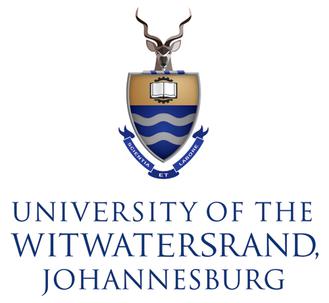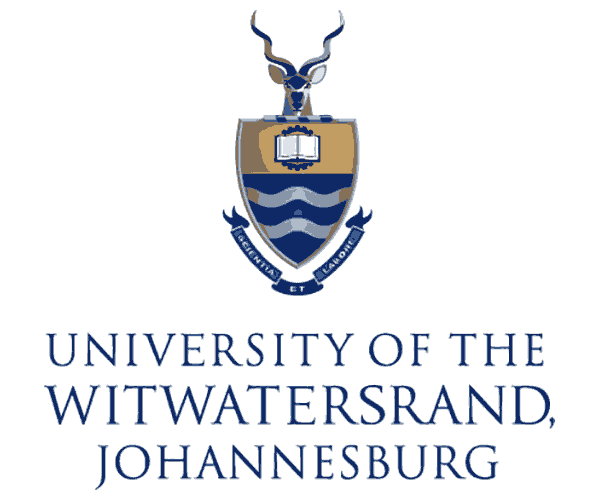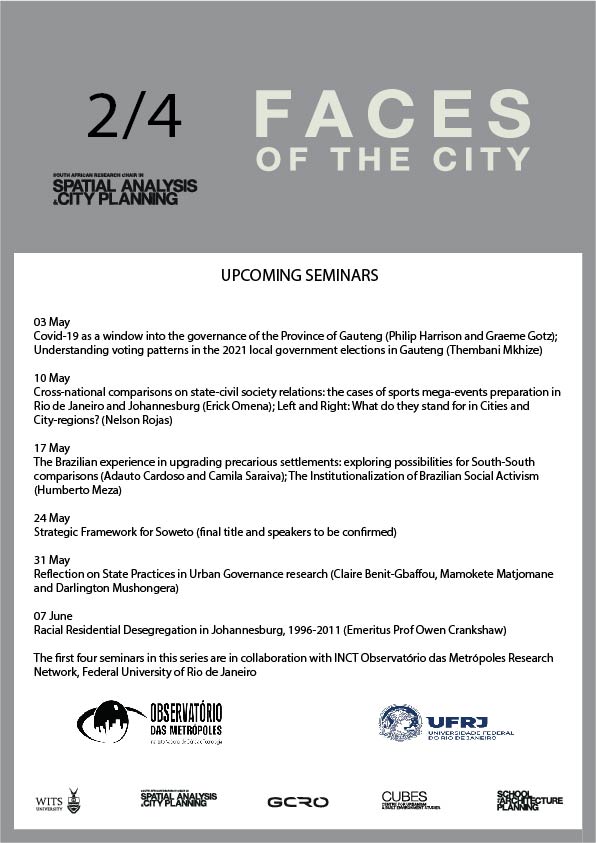 Na próxima terça-feira (dia 26 de abril), às 11h, terão início os seminários de cooperação internacional “Faces of the City”, organizados conjuntamente pelo INCT Observatório das Metrópoles e o Departamento de Planejamento Urbano da University of the Witwatersrand, de Joanesburgo. A iniciativa visa discutir alguns dos principais desafios urbanos compartilhados pelas metrópoles brasileiras e sul-africanas, como reurbanização de favelas, governança urbana participativa, novas dinâmicas do associativismo urbano contemporâneo e tendências político-eleitorais locais. Busca-se, assim, fomentar a colaboração futura em pesquisa, ensino e extensão entre os países com vistas à elaboração de novos projetos que trabalhem o tema da reforma urbana em perspectiva comparada.
Na próxima terça-feira (dia 26 de abril), às 11h, terão início os seminários de cooperação internacional “Faces of the City”, organizados conjuntamente pelo INCT Observatório das Metrópoles e o Departamento de Planejamento Urbano da University of the Witwatersrand, de Joanesburgo. A iniciativa visa discutir alguns dos principais desafios urbanos compartilhados pelas metrópoles brasileiras e sul-africanas, como reurbanização de favelas, governança urbana participativa, novas dinâmicas do associativismo urbano contemporâneo e tendências político-eleitorais locais. Busca-se, assim, fomentar a colaboração futura em pesquisa, ensino e extensão entre os países com vistas à elaboração de novos projetos que trabalhem o tema da reforma urbana em perspectiva comparada.
No primeiro encontro, os professores Marie Huchzermeyer e Neil Klug apresentarão uma avaliação crítica do Programa Nacional de Reurbanização de Favelas da África do Sul e de sua implementação ao longo das últimas décadas, em especial na cidade de Joanesburgo. Pesquisadores e estudantes de graduação e pós-graduação brasileiros e sul-africanos são bem-vindos para contribuir com a discussão, que terá foco na identificação de similaridades e diferenças entre as duas realidades, bem como na reflexão sobre possíveis soluções compartilhadas no âmbito dos programas de reurbanização e voltadas à garantia dos objetivos históricos da reforma urbana.
A participação é aberta ao público, através do link da videoconferência (as apresentações e discussões serão realizadas em inglês):
Zoom link: https://wits-za.zoom.us/j/93584078767?pwd=VThtaGxWODZpSUI0Ukg0enh5eFZzdz09
Meeting ID: 935 8407 8767
Passcode: 797408
Veja abaixo a programação:
Faces of the City Seminars
26 April 2022 | Upgrading of informal settlements in South Africa – policy, policy engagements, diversions and failed efforts at unblocking implementation – Neil Klug and Marie Huchzermeyer
South Africa adopted an informal settlement upgrading programme into its national legislation through the Housing Code in 2004. In this presentation we provide background on the South African housing delivery and informal settlement situation and the introduction and approach of the Upgrading of Informal Settlements Programme (UISP). We provide an overview of the trajectory of the UISP at a national level, including fluctuating political leadership and the initiatives of responsible entities. We use the national Human Settlement department’s response to COVID-19 through a sector engagement platform and temporary relocation, as well as subsequent deliberation platforms that have involved non-state actors, to illustrate the challenges with resolving blockages to implementation. We then turn to the case of the Slovo Park informal settlement upgrade, for which we have served on a City of Johannesburg task team as technical support to the Slovo Park Community Development Forum for the past five years. The settlement-level trajectory illustrates the insurmountable challenges in unlocking implementation, suggesting need for a fundamental review of how government funding is spent on informal settlements.
Neil Klug is an urban planner and designer and is a senior lecturer (80% time) at the University of Witwatersrand’s Planning School and now has over 20 years of teaching experience. In 2016 he registered for a PhD degree at the University of the Witwatersrand dealing with the topic of planning instruments and their efficacy in transforming the post-apartheid spatial legacy. In the remaining 20% time he works as a planning consultant with now over 30 years’ experience. His areas of specialisation include housing policy, particularly informal settlement (slum) upgrading, land use planning and land tenure arrangements. Over the past decade he has published several articles in local and international journals, and book chapters with colleagues, related to the above topics.
Marie Huchzermeyer is a Professor in the School of Architecture and Planning where she has convened a masters degree in the field of housing for the past two decades and more recently the wider Masters of Urban Studies. Besides teaching in the urban studies and housing field and higher degree supervision, she is currently in the rotating role of Director of the Centre of Urbanism and the Built Environment Studies (CUBES), a small research centre embedded in the School. Marie’s research and publications have been on informal settlement and housing policy and private rental housing. Her current research explores informal settlements through the lenses of Henri Lefebvre as well as the right to development.
03 May 2022 | Covid-19 as a window into the governance of the Province of Gauteng – Graeme Gotz and Philip Harrison
With the Covid-19 pandemic, critical questions have surfaced around the capacity of the state to respond with agility to the crisis, and to use the crisis in a transformational way over the longer term. We have explored these questions are addressed in a comparative study of the State of Kerala in India and the Province of Gauteng in South Africa, together with Dr. Rob Moore, and colleagues from India, Professors Tathagata Chatterji and Souvanic Roy. In this presentation we focus on the Gauteng story, although with limited reference to Kerala. While both territories showed significant agility in response to the crisis, Kerala strengthened its capacities in a way that Gauteng did not, and this had significant implications for the abilities of these government to both manage the pandemic and leverage the pandemic for longer term benefit.
Graeme Gotz is Director of Research Strategy at the Gauteng City-Region Observatory, where he works with a team of researchers to define and drive the research agenda of the GCRO. He previously worked at the Central Strategy Unit, Office of the Executive Mayor, at the City of Johannesburg; as a research consultant specialising in local government and urban development; as a member of staff at the Graduate School of Public & Development Management (P&DM) (now the Wits School of Governance), at the University of the Witwatersrand; and as a researcher at the Centre for Policy Studies (CPS). Graeme’s academic work focuses on city development and urban renewal, urban economic development, local government, government strategy, intergovernmental relations and state theory.
Philip Harrison is the South African Research Chair in Spatial Analysis and City Planning funded by the National Research Foundation and hosted by the University of the Witwatersrand. From 2006 to 2010 he was Executive Director in Development Planning and Urban Management at the City of Johannesburg. Prior to that, he held academic positions at the Universities of the Witwatersrand and Natal. He also served as a He served as a member of the National Planning Commission in the Office of the President from 2010 to 2015, participating in the formulation of the National Development Plan. He has published widely in the fields of city planning and regional and urban development. His most recent book publication is the jointly edited Densifying the City: Global Cases and Johannesburg
Understanding voting patterns in the 2021 local government elections in Gauteng – Thembani Mkhize
In the media, there have been numerous headlines portraying post-apartheid South Africa’s sixth municipal elections as the most disastrous elections – lowest voter turnout, highest loss of votes by main political parties – in post-democratic history. Indeed, the 2021 elections, especially on the surface, represent a dramatic shift in political sentiment, affiliations and identities in South Africa. A closer, more detailed look at voting patterns in South Africa (for instance, spatial analyses of voter distribution across space and a study of electoral trends over time) reveals more nuances to the issue than meets the eye. Using the case of Gauteng city-region – the smallest yet most populous and most diverse province in South Africa – the presentation is concerned with exploring the shift in political sentiments within Gauteng in the 2021 local government elections. It does so by analysing Proportional Representation (PR) votes won by each of the top political parties in Gauteng since 2011 as well as mapping the distribution of the PR votes in the 2016 and 2021 municipal polls using detailed dot density maps. I also focus on the spatial distribution of Gauteng’s registered voters who did not vote in the 2021 elections (registered non-voters) and attempt to provide an account of the low voter turnout in Gauteng. I do this by drawing on two recent surveys. The first is a telephonic survey aimed at unpacking the reasons for 2021’s low voter turnout in five of South Africa’s metropolitan municipalities. The second is the Gauteng City-Region Observatory’s (GCRO) Quality of Life Survey (QoL), which has been conducted every two years since 2009 and gives a unique perspective on changing political attitudes and perceptions in Gauteng.
Thembani Mkhize holds three qualifications from the University of the Witwatersrand, Johannesburg – a BSc in Urban and Regional Planning, a BSc (with Honours) in Urban and Regional Planning and a(n) MSc in Town and Regional Planning (in the field of Urban Studies). With wide research interests such as urban branding, municipal re-demarcation, urban regeneration, community participation and social cohesion (as a buzzword, concept and a policy objective), Mkhize’s interests revolve around processes at work in cities as well as their implications for governance and urbanity. A researcher at the Gauteng City-Region Observatory (GCRO), Mkhize is currently leading a project on the politics and dynamics of street renaming in post-apartheid South Africa, with a focus on two Gauteng metropolitan municipalities (Pretoria/Tshwane and Johannesburg). The research touches on renaming motivations, processes, merits, shortcomings (including associated challenges), and implications for the urban and South African social fabric.
10 May 2022 | Cross-national comparisons on state-civil society relations: the cases of sports mega-events preparation in Rio de Janeiro and Johannesburg – Erick Omena
How is power exerted by the state to prevent and confront dissent? What are the differences found between countries when considering this issue? What are the main underpinnings of such differences? By exploring international cases of urban redevelopment projects associated with sports mega-events, this research presents some reflections to help answer these questions. As such, the specific objectives of this study are 1) to understand what kind of strategies and tactics have been used by governments to respond to the action of groups unhappy with the impacts of urban developments associated with the FIFA World Cup in Rio de Janeiro and Johannesburg, particularly with their land clearance demands and 2) to contrast the respective results found for each host city.
Erick Omena is a lecturer at the Institute of Research on Urban and Regional Planning / Federal University of Rio de Janeiro (IPPUR-UFRJ) and member of the Observatório das Metrópoles research network. He has a PhD in Spatial Planning and Urban Politics awarded by Oxford Brookes University. His research interests focus on the interface of social theory, urban planning and political economy.
Left and Right: What do they stand for in Cities and City-regions? -Nelson Rojas de Carvalho
As it is widely known in the fields of public policy and urban studies, research work on the impact of ideology and party politics on cities’ policy outputs is few and far between. Even though ideology and political orientation have been placed in a central position in the studies on elections, voter’s choice, electoral coalitions, and government formation, they have been destined to a marginal position as a variable able to explain policy outputs, both at the national and subnational levels. As Douglas and Sharpe (1984) remind us, until recently “output “analyses were the domain of disciplines such as economics and sociology. Policy results were mainly explained by sociodemographic factors.
While following the same intellectual path of output research, we have tried to evaluate to what extent the neoliberal wave that swept Latin American cities in the last two decades has been either fastened or braked by political factors. In a word, if Latin American cities, severely affected by huge national deficits, have resorted to neoliberal regulatory practices, and have been acting more and more like “growth machines”, it was reasonable to expect that the neo-liberalization process could be, if not completely reversed, hindered in left-oriented municipalities. With the database of 5,570 Brazilian municipalities in Brazil, we have correlated over 20 years the cities’ political orientation with their commitment to neoliberal practices and regulations. We found no “left-wing” or “right-wing” effect on the degree and direction of such commitment.
Thus, if at the local level the left-right divide has little or no impact on the cities’ spending patterns or the extension neoliberal practices are put in place, the academic research should try to spot where this divide makes a difference in the life of cities. Assuming that the left-right axis has evolved in its meaning over time, in this paper we have tested the hypothesis according to which left-oriented municipalities would be more prone to support and enhance pluralism than right-oriented cities. Resorting to the 2019 Census database (MUNIC) of Brazilian municipalities, we have tested the hypothesis according to which left-oriented cities would be more likely to protect and enhance minority rights than right-oriented municipalities. Resorting to data on the 5570 Brazilian municipalities and their policies regarding the protection of minority groups and the defense of human rights, we did not find any ideological cause behind the variation of those policies along Brazilian municipalities. if the left/right divide says little about spending patterns and economic policy, it also does not make a difference as far as pluralism is concerned. Academic research is still challenged to find where such a divide makes a difference in the life of the cities.
Nelson Rojas de Carvalho is political scientist and associate professor at PPGCS/UFRRJ. He holds a MSC in Comparative Politics at LSE ( London School of Economics and Political Science) and a Phd in Political Science at IUPERJ. He is member of the Observatório das Metropoles and leader of the research team LEPPEM. He’s been carrying out research in the following fields: elections, electoral geography, congress, metropolitan governance and local power.
17 May 2022 | The Brazilian experience in upgrading precarious settlements: exploring possibilities for South-South comparisons – Adauto Cardoso and Camila Saraiva
This presentation brings the main results of two national research projects on upgrading precarious settlements in Brazil. The first one mapped and analysed the scope of interventions enabled by the Growth Acceleration Programme (PAC) – an ambitious national programme aimed at funding upgrading projects to be designed and implemented by states and municipalities on an unprecedented scale. The second research project traced the historical development of specific institutional conditioning factors that determined the performance of certain municipalities receiving PAC funds. The goal is to highlight specific questions and topics that could be interesting to think comparatively about the Brazilian and South African experiences regarding in-situ upgrading policies and programs.
Adauto Cardoso is a Professor at the Institute of Research on Urban and Regional Planning / University of Rio de Janeiro (IPPUR-UFRJ) and a member of the Observatório das Metrópoles. He holds a PhD in Architecture and Urbanism from the University of São Paulo (USP). His research interests focus on urban planning, social housing, and in-situ upgrading policies.
Camila Saraiva is an Urban Studies Foundation Postdoctoral Fellow at the University of the ABC Region (UFABC). She holds a PhD in Urban and Regional Planning from the University of Rio de Janeiro (UFRJ) and was a visiting research student at the Department of Geography of University College London (UCL). Her research interests focus on urban inequalities, in-situ upgrading policies and comparative urbanism.
The Institutionalization of the Brazilian Social Activism – Humberto Meza
This presentation is a result of the research on Social Activism in the contemporary Brazilian Metropoles. The class aims to introduce the students into the debate on the phenomenon of civil society associations along the Brazilian democratic trajectory, after the end of the dictatorial period. These actors are understood as interest organizations, factions, pressure groups, corporations or organized agents of civil society have been analyzed from their effects – undesirable or not – for democratization, according to the theoretical approach adopted. Our intention is to understand this role and its effects on metropolitan governance starting from the data obtained from the office ial databases about third sector organizations. The research shows a modification of the activism phenomena into a consolidation of religious and party activism in Brazilian Metropoles.
Humberto Meza is researcher in the National Institute of Science and Technology, INCT Observatorio das Metropoles within the Institute of Urban and Regional Planning and Research (IPPUR) of Federal University of Rio de Janeiro. He holds a PhD in Political Science by the University of Campinas (UNICAMP), in the field research of Collective Action, Social Movements and the interaction with political institutions. Was researcher at the Brazilian Research Center (CEBRAP) in Political Participation and Collective Action.
24 May 2022 | Strategic framewrok for Soweto – (final title and speaker to be confirmed)
31 May 2022 | Reflection on State Practices in Urban Governance research – (Claire Benit-Gbaffou, Mamokete Matjomane and Darlington Mushongera)
07 June 2022 | Racial Residential Desegration in Johannesburg, 1996-2011 – (Emeritus Prof Owen Crankshaw)
Dúvidas sobre o evento podem ser direcionadas para: facesofthecity.wits@










